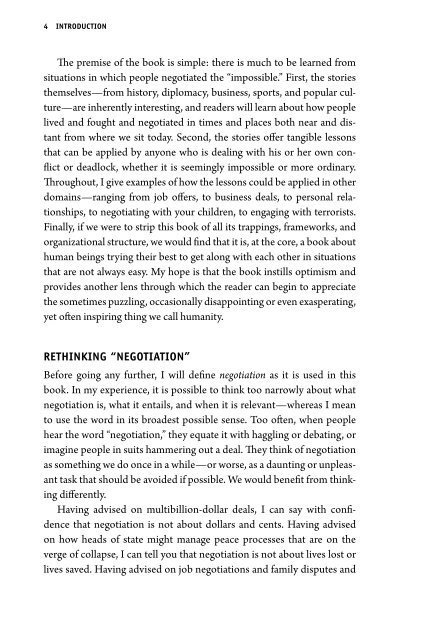NEGOTIATING IMPOSSIBLE
28SQZUn
28SQZUn
You also want an ePaper? Increase the reach of your titles
YUMPU automatically turns print PDFs into web optimized ePapers that Google loves.
4 INTRODUCTION<br />
The premise of the book is simple: there is much to be learned from<br />
situations in which people negotiated the “impossible.” First, the stories<br />
themselves—from history, diplomacy, business, sports, and popular culture—are<br />
inherently interesting, and readers will learn about how people<br />
lived and fought and negotiated in times and places both near and distant<br />
from where we sit today. Second, the stories offer tangible lessons<br />
that can be applied by anyone who is dealing with his or her own conflict<br />
or deadlock, whether it is seemingly impossible or more ordinary.<br />
Throughout, I give examples of how the lessons could be applied in other<br />
domains—ranging from job offers, to business deals, to personal relationships,<br />
to negotiating with your children, to engaging with terrorists.<br />
Finally, if we were to strip this book of all its trappings, frameworks, and<br />
organizational structure, we would find that it is, at the core, a book about<br />
human beings trying their best to get along with each other in situations<br />
that are not always easy. My hope is that the book instills optimism and<br />
provides another lens through which the reader can begin to appreciate<br />
the sometimes puzzling, occasionally disappointing or even exasperating,<br />
yet often inspiring thing we call humanity.<br />
RETHINKING “NEGOTIATION”<br />
Before going any further, I will define negotiation as it is used in this<br />
book. In my experience, it is possible to think too narrowly about what<br />
negotiation is, what it entails, and when it is relevant—whereas I mean<br />
to use the word in its broadest possible sense. Too often, when people<br />
hear the word “negotiation,” they equate it with haggling or debating, or<br />
imagine people in suits hammering out a deal. They think of negotiation<br />
as something we do once in a while—or worse, as a daunting or unpleasant<br />
task that should be avoided if possible. We would benefit from thinking<br />
differently.<br />
Having advised on multibillion-dollar deals, I can say with confidence<br />
that negotiation is not about dollars and cents. Having advised<br />
on how heads of state might manage peace processes that are on the<br />
verge of collapse, I can tell you that negotiation is not about lives lost or<br />
lives saved. Having advised on job negotiations and family disputes and


